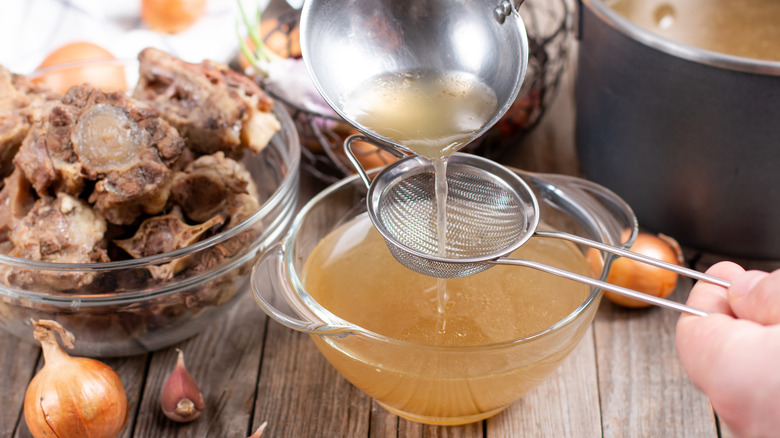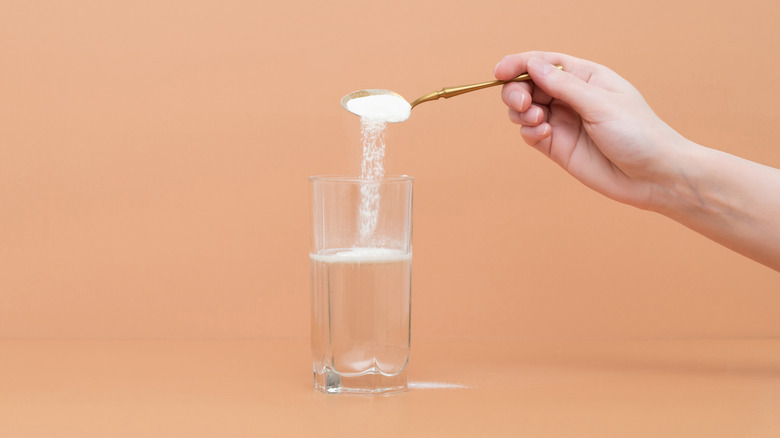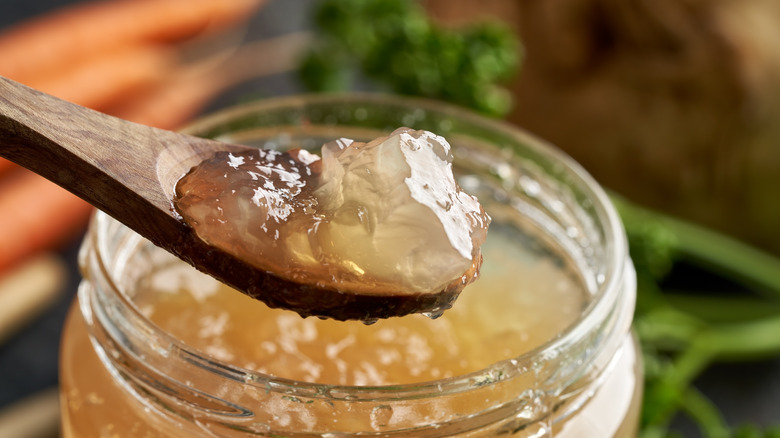You're Only One Ingredient Away From Richer Bone Broth Every Time
If you've looked into trying out a new diet in the past decade you've likely come across the paleo diet, and its followers' deep obsession with bone broth. While this magical cure-all may not be as effective as its fans claim, it is still a deeply satisfying and nutritious food item that can be made at home using what are essentially food scraps.
If you are interested in getting the most nutrition possible from your bone broth though, then you'll need to make sure you're adding one special ingredient — an acid. One of the key nutritional assets of bone broth that is often touted is its high collagen content. Some of the claims around what consuming collagen can do for your body may be exaggerated or understudied, but it is one of the key qualities of a good bone broth.
It doesn't take a lot, and you've got options to choose from, but that acidity is the key to extracting collagen in the bone's marrow. Apple cider vinegar, wine, and lemon juice are all good options to choose from. Just add a few tablespoons, or up to a half-cup to your broth while it simmers, and you'll be set.
What is collagen?
Collagen is the much coveted nutrient at the center of bone broth obsession, but what exactly is it? Collagen is a type of protein that essentially serves as one of the body's key building blocks. It makes up our bones, skin, and joints. It actually makes up about 30% of our body's total protein.
The real health benefits of consuming bone broth, and in turn collagen, are not quite as fantastic as its proponents will have you believe. According to Mother Jones, some claim that bone broth will cure digestive issues, repair bones, and make you look younger. However, many of these claims are likely exaggerated. When your body digests collagen it takes the many amino acid chains and will store them to use where it decides it is most needed. That doesn't necessarily mean that it will go to your aching joints, though. There are some studies showing that collagen supplements may improve skin health, but equivalent studies haven't been conducted yet for bone broth.
NPR says that two claims that are supported by academic studies are that it may boost your immune system (the reason why chicken soup is thought to cure the common cold), and does replenish electrolytes lost during a strenuous workout. Beyond these qualities though, it's hard to say how beneficial it really is to consume bone broth regularly.
How to tell if there's collagen in your broth
Whether or not you're only drinking bone broth for the collagen, your body will still be able to break it down for its valuable amino acids. If you're going to go through the trouble is slow-simmering bones all day you might as well get all the nutrition from it that you can.
One sign that you might not be getting all you could out of your bone broth is if it doesn't gel. When bone broth comes to room temperature it should form into a jiggly, jelly-like substance. This is because the collagen will reform into gelatin when it cools. When reheated it will then return to liquid. The reason this is important is that a broth that doesn't gel is usually a broth with less collagen.
Beyond adding that acid, another reason for this might be that you aren't using the right bones. Different bones are going to have different collagen quantities. The best bones are typically joints like the knuckle bones from cows, or the feet and neck bones from chickens and turkeys. WIth these, and a little bit of acid you'll be sure to have a nicely gelled broth every time.


